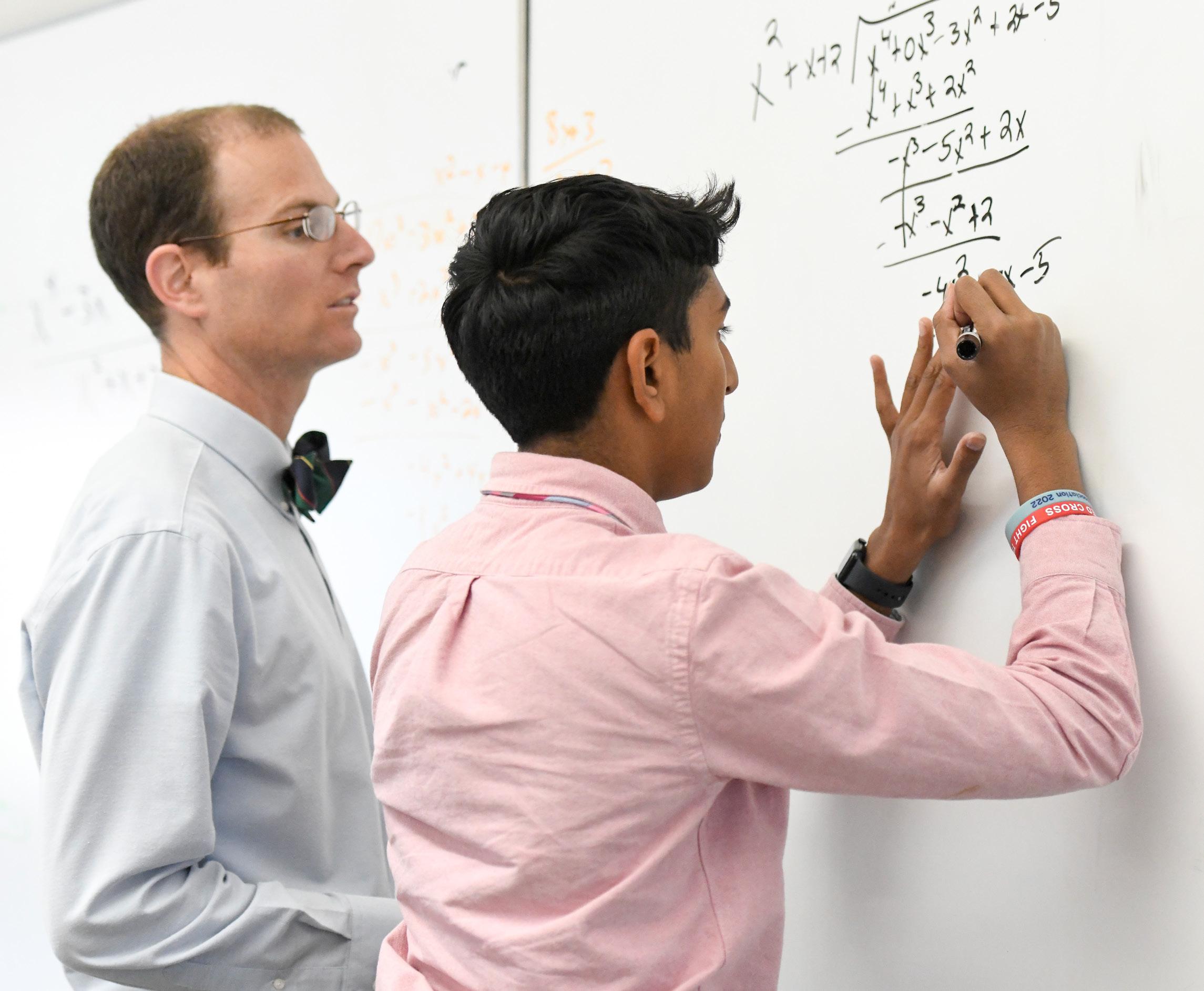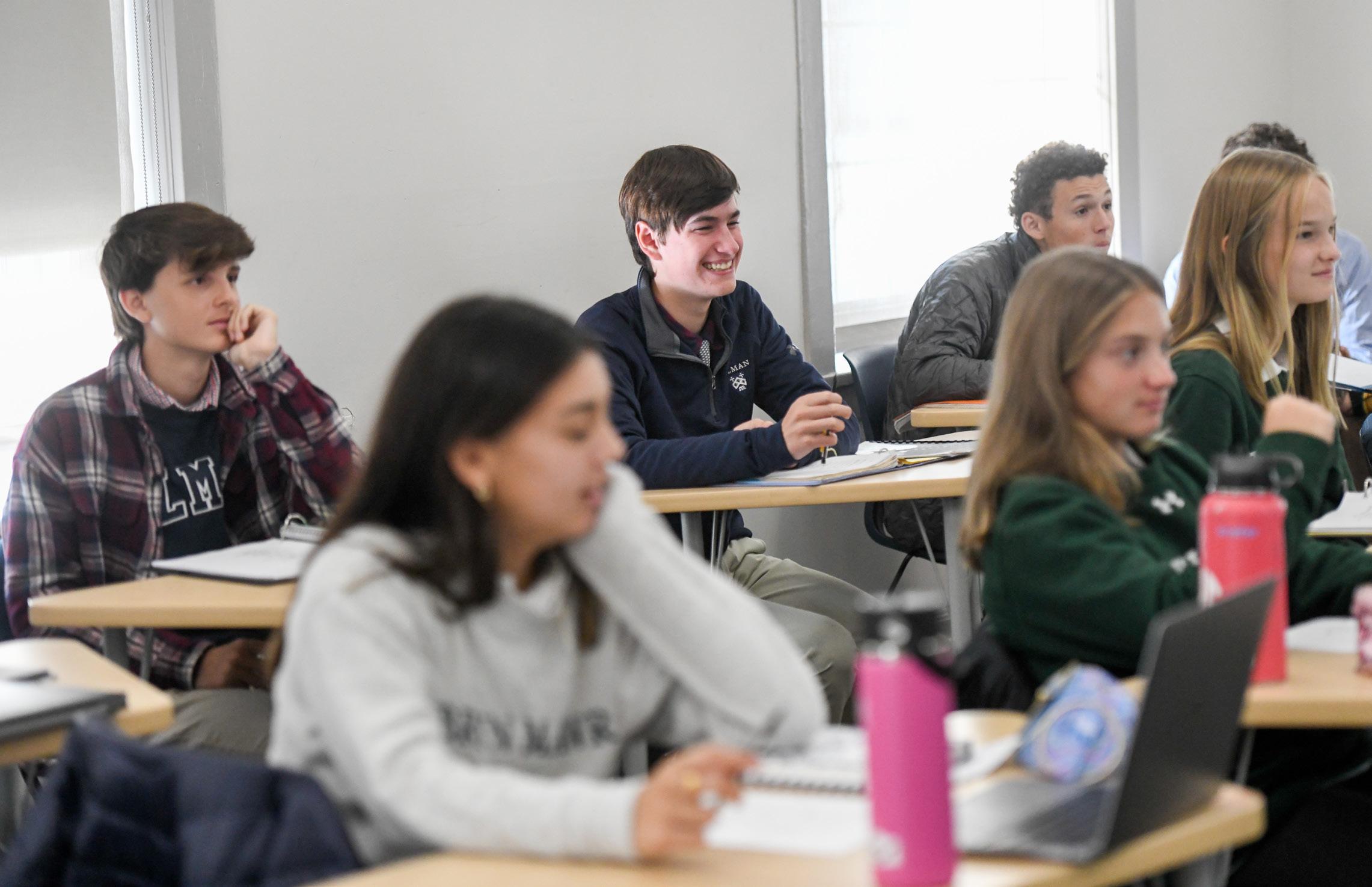
8 minute read
mathematics
The Gilman Upper School Mathematics program presupposes a firm foundation in first-year algebra in the eighth grade. The graduation requirement is three years of mathematics, which is math through pre-calculus with trigonometry. This minimum requirement should enable Gilman students to continue their study of mathematics at the college level. Our program also attempts to meet the needs of exceptionally talented students with a strong interest in mathematics with an honors sequence. We offer an accelerated and enriched program for these students, which prepares them for the Advanced Placement examinations in AB Calculus, BC Calculus, and Statistics. For those students who complete this honors program in less than four years, the Mathematics department will offer instruction in additional topics to the extent that staffing and scheduling permit.
Departmental approval is required for enrollment in an honors or an Advanced Placement course. The Mathematics department encourages movement between honors and regular classes to best serve each student. In order to ensure that students are successful in their course placement, we have found that the following guidelines are appropriate. In order to move from a regular to an honors section, a student must complete the year with at least a 92 average in the regular sections with grades higher than 90 on both the midyear and final exams. They must also have a recommendation from their teacher that they possess the proper work habits and a talent for problem-solving.
9TH GRADE COURSES – REQUIRED
ALGEBRA
I
This course introduces students to the theory and structure of algebra and builds a foundation for more advanced classes. At its heart, algebra is a generalization of arithmetic in which symbols represent numbers. This course provides a starting point for many of the topics students will study throughout Upper School such as simplifying expressions, solving equations, graphing functions, and representing real-world situations using numbers and symbols.
Algebra Ii
This course, which is usually taken by ninth graders, presents topics in number systems, functions, systems of equations and inequalities, quadratics, exponentials and logarithms, plus additional topics as time allows.
ALGEBRA II (HONORS)
This is the first level in the Honors sequence and presupposes a commitment to taking the AP exam in the 12th grade. The course is accelerated and enriched and includes, in addition to the topics covered in Algebra II, rational and irrational functions, polynomial theory, and other topics as time allows.
9TH GRADE COURSE – ELECTIVE BASEBALL AND STATISTICS
This course is a full exploration into the world of baseball and statistics. Most boys are familiar with baseball and have watched or played it for years. This is a great opportunity to explore concepts of elementary statistics through the lens of baseball. This course offers an opportunity to explore the following concepts of mathematics/statistics: distributions, probability, graphs, and expectations. We will also explore how the game has changed through the years and get an introduction to programming in R, a statistical software package widely used in baseball analysis.
10TH GRADE COURSES – REQUIRED GEOMETRY
This full-year course in Euclidean geometry is designed for the average 10th grade student.
GEOMETRY WITH TRIGONOMETRY (HONORS)
This course covers the traditional topics of Euclidean geometry with special emphasis on definition and formal proof. It also includes a study of non-Euclidean geometry and as time permits a portion of trigonometry with emphasis on applications.
11TH GRADE COURSES – REQUIRED
PRE-CALCULUS
This course continues the study of Algebra II through polynomials, systematic counting, probability, and conics.
The course also presents a full study of trigonometry. Some work with sequence and series and some math modeling is presented. Prerequisites: Algebra II and Geometry.
AB PRE-CALCULUS (HONORS)
The unifying theme in this course is that of functions. Topics covered include polynomials, transformation of functions, exponential and logarithmic functions, and trigonometry. An extensive look at trigonometry is taken before ending the year with a look at the foundations of calculus, including the concept of a limit and an introduction to the derivative.
BC PRE-CALCULUS (HONORS)
This course devotes the first semester of the year to studying functions of both finite and infinite mathematics. Emphasis is placed on the traditional pre-calculus topics including selected topics from trigonometry, the inverse trig functions, polar coordinates, polar forms of complex numbers, vectors and other topics to prepare for calculus. The second semester of the course introduces differential calculus and applications of the derivative to prepare students to enter the AP Calculus program; this course is a prerequisite for AP BC Calculus.
11TH GRADE COURSE – ELECTIVE
AP STATISTICS
Please see the description under 12th Grade Course Electives.
12TH GRADE COURSE ELECTIVES – YEAR

CALCULUS (BMS, GILMAN)
The emphasis of this course is for students to be able to select and apply calculus concepts in the context of problem-solving. The course will strengthen the algebraic underpinnings of calculus and re-examine advanced pre-calculus skills as it explores such calculus topics as limits, continuity, differentiation, and integration.
A P AB CALCULUS (BMS, GILMAN, RPCS)
The syllabus follows the guidelines of the Advanced Placement exam in AB Calculus. After a study of functions and their inverses, limits, and continuity, the focus of the course is the introduction of differential and integral calculus and its applications such as max/ min problems, related rates, curve sketching, areas, and volumes. All students are expected to take the AP exam.
AP BC CALCULUS (BMS, GILMAN, RPCS)
This course completes the study of the syllabus for the AP exam in BC Calculus. The course begins with a review of the derivative and its applications. The course then covers additional applications of differential calculus, the definite integral and its applications, computation of antiderivatives, series, and Taylor’s formula, and some work on solving simple differential equations. All students are expected to take the AP exam.
AP STATISTICS (BMS, GILMAN, RPCS)
Designed for students who will be pursuing a variety of college majors. Statistics is a branch of mathematics that almost all students will find to be very useful. Topics in both descriptive and inferential statistics are covered, as well as ideas concerning probability. Some of the data needed is collected by students, and other information gathered from newspapers, government databases, medical data, political and environmental surveys, and other sources. Some simulations and uses of computer software and graphing calculator applications are included. There is emphasis on the interpretation of statistical results as well as the predictive power of statistics. Students in the RPCS section are required to have a TI-84 graphing calculator for this course, to complete mandatory summer reading, and to take the AP exam in May.
Data Analysis
In this course, students will learn how to work with data in many forms to analyze real-world questions in a broad range of topics including politics, health, the environment, and economics. Students will experiment with data visualization, data modeling, simulation techniques, machine learning, and research methods to study topics of their choosing through a combination of projects. We will build upon students’ mathematical foundations in algebra and geometry and learn fundamentals of probability and statistics. We will also introduce programming basics in R/R-Studio (a common programming language in data science professions) to complete projects.
Financial Math
This course provides a curriculum focused on understanding key data analysis, probabilistic concepts, calculations, and actuarial science. Students are challenged to work toward a mastery of computational skills, deepen their comprehension of key ideas and solution strategies by extending their knowledge through a variety of real-world problem-solving applications leading them to understand how current and historical events can be described quantitatively. Through a combination of traditional classes, guest speakers, and projects, students explore the connections between algebra, geometry, data, statistics, and probability.
STATISTICS (RPCS)
This course is an introduction to statistics, a field whose ideas and concepts pervade modern society and whose importance in business, technology, science, and research is considerable and ever growing. The course consists of three parts: descriptive statistics, probability, and inferential statistics. Topics include: sampling techniques; data display; large and small sampling theory; binomial and normal probability distributions; and regression and correlation. Applications of inferential statistics are introduced in business, economic, and industrial contexts. Students will design and administer an original survey with a partner to use as the data set for their semester-long project. In addition, students will be assessed on smaller units through tests and/or hands-on investigations and smaller projects. Students will become proficient in using technology to analyze and summarize their data. This course will develop competencies in Excel and on TI graphing series calculators. We will use an online textbook called “Mymathlab.”
Topics In Combinatorics
This course, designed to be taken after or concurrently with BC Calculus explores the central question: How can we count objects? The course will start off with classic counting techniques in combinatorics, including the pigeonhole principle, and induction, then moving to the binomial theorem and generating functions. Finally, we will study graph theory, including cycles and Ramsey theory. Students will learn and practice elementary proof writing and will learn the math type-setting language LaTeX to write their solutions.
12TH GRADE COURSE ELECTIVES –FIRST SEMESTER
DISCRETE MATH Semester I (BMS)
Discrete Mathematics for the Humanities and Social Sciences: If you have ever thought, “When will I ever use this math?” then this is the course for you. Discrete Mathematics has applications in a wide and diverse range of interesting fields, including architecture, interior design, art, business, transportation and scheduling, politics and government, city planning, international policies, economics, sports, entertainment, and computer security. In this course, topics covered will include matrices and Markov chains, graph theory, linear programming, optimization, voting methods, game theory and fairness, and codes and cryptography. Students will research new mathematical ideas and practicing new mathematical techniques, as well as complete projects and written assignments to investigate specific applications of discrete mathematics.
MULTIVARIABLE CALCULUS (HONORS) Semester I (BMS)
This course is a continuation of the study of functions begun in the B and C semesters of Advanced Placement Calculus. The course focuses on applications and extensions of topics covered in BC, and it is designed to provide closure to some of those topics while, at the same time, preparing students for their uses and applications in both the theoretical and applied mathematics the students will see in college. Topics include the mathematics of vectors with dot and cross products, graphing functions in three dimensions, partial derivatives, and methods to locate extrema and saddle points on surfaces. If time permits, there will be an investigation of multiple integrals to calculate area, volume, surface area, and arc length in three dimensions. Prerequisite: AP BC Calculus.
12TH GRADE COURSE ELECTIVES –SECOND SEMESTER
TOPICS IN COLLEGE MATHEMATICS (HONORS) Semester II (BMS)
This course is designed to enable students with significant interest, ability, and preparation in mathematics to investigate some of the subject’s elegant theoretical underpinnings. The class will introduce students to mathematical modeling — the process of using mathematical structures (including equations, functions, geometric shapes, and matrices) to capture some of the aspects of the behavior of natural and human-made phenomena. Conclusions and results of this mathematics can help predict what will happen with the real phenomena. Mathematical modeling topics explored in the class will be selected from linear programming, iterated functions, regression analysis, difference equations, predator-prey models, traffic simulations, coding, apportionment, election theory, graph theory, and Markov processes. In addition to mathematical modeling, other topics could also include graph theory, Boolean algebras (with symbolic logic and circuit theory), and group theory. These topics are treated with a thoroughness and rigor matching that of a university-level mathematics major, and the course should provide a glimpse of the world of the working mathematician.
Prerequisite: Successful completion of the first semester of AP AB or BC Calculus.










